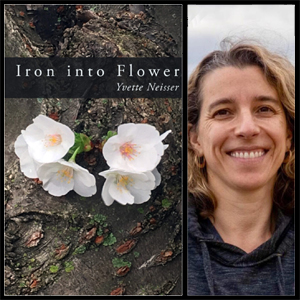|

In her new collection, Iron Into Flower, Yvette Neisser has achieved
poetic alchemy, transmuting loss into wisdom, grief into joy—or at least
acceptance, memory into living presence.
The book begins with three family poems, the first addressed to her mother
who has revealed that at 18, she took an adventurous and risky trip through
the Deep South by bus to Mexico. "It was 1965, you were/a young woman
breaking out…./three days through the Deep South, where/segregation was
shaking at the seams…./Maybe you were no longer white,/having absorbed
the Aztec sun./Maybe you had shed fear." ("Arc of the Sun') This poem also
foreshadows others dealing with Hispanic traces in the poet's past and
present.
The poem that follows is dedicated to the memory of the poet's
grandmother, a nostalgic remembering of tea "Served black with sugar…/it
opened the door/to the secret world of grown-ups." Always tea, "[n]ever
replaced with coffee or wine," nor used as augury, flavored with fruit. or
diluted with milk. Like Proust's madeleine dipped in tisane, "[l]et color
seep into hot water,/let steam rise into memory.//Drink it Lipton. Drink it
black." ("Tea")
The third poem in this trilogy of forebears remembers hikes with the poet's
father: "This is our history; we'd enter the woods." Though the father races
to the top of their hills "impatient to see the view from every angle," and
the poet prefers the climb itself, " discovering detours and hidden nooks,
/exploring every path," father and daughter "both loved to look/for
sunlight above the tree line,/ to ponder a certain rock/or fallen tree ringed
with time,/as the years have etched rings around my life,/first with you,
then without you." ("Compass Points")
Entitled "Nonfiction," the book's next section moves outward and further
back in time, considering the Holocaust and its effects on the poet's family.
"Revisionist History" imagines a "world without Hitler," in which "the
synagogues would still be standing…./the great house in Frankfurt/could
still belong to our family….//Gas chambers never invented…./My aunt's
first word, not Achtung….//I could have read Rilke in the original./People
would be able to pronounce my names." (The final poem in the section,
"The Whole Imperfect Lot of Us," echoes Rilke in its opening line. "You
must change your life,/say the rabbis of old," reminding the reader of
Rilke's identical admonition—perhaps he took it from Rabbinical wisdom.)
"Dayenu" (Hebrew for "it would have been enough," a song that is part of
the Passover service) recognizes the bitter irony that the state of Israel that
has provided haven for many Jews in the post-Holocaust era, is often guilty
of persecuting its Palestinian residents. "Had He taken us out of Europe
alive,/it would have been enough." A litany of Israeli injustices follows:
checkpoints, occupation of Jerusalem, disrespect for Muslim observances,
bombing of Palestinian homes. Had the Israeli government shown restraint
and respect for its Palestinians while maintaining security for the Jews, "I
swear it would have been enough."
The next part of the collection is called "Echoes," and relates more directly
personal stories. "Yvette" delineates the etymology of the poet's name and
notes that she was named after her father's favorite second grade student
and also reflecting her mother's love for French. In "Becoming Latina," the
speaker ponders the nature of identity. "Was it when I claimed/my own
last name—Moreno…?" taking her husband's last name, and claiming a
space in his heritage. "[D]oes that make you Latina?"
The complex emotions around childbearing are limned in "Spark": How
does a tiny mass of cells/become this heartbreaking creature,/a full bodied
human?..."
"Season of Grief," the fourth section, deals with losses, some inevitable,
some perhaps unexpected. "A closet full of tools/I cannot name" is one of
many things abandoned by a husband after a divorce in "Things You Left
Behind." "Your last name/on every document I own./The hollow of its
vowels." "Season of Grief" lists the losses that are perhaps most deeply felt
in autumn: "our first loves. All the sunsets/we missed….//Grieve your
father./He always leaves you in this season….//Let go/as the leaves do,
/loosening hold on the stem/of each leaf/until they float into the
air/weightless" (another echo of Rilke—see his "Autumn Day").
The final part of the collection, "Iron Into Flower," continues and sums up
Neisser's alchemical verse. In a manner similar to her earlier poem about
her first name, the poet now considers her surname: "This name I have
carried all my life./From a river dividing two countries…./I take Neisser to
be my beloved name./in love and anger, sickness and health….//I shed the
letters of marriage/and watch them float away." ("Neisser") Unmitigated
joy arises in "Spring Is Riotous": "Moths flutter into windows,/cherry
blossoms swirl and fall…./In this I awaken…." The final poem expresses a
mixture of hope and determination. "Hungry for color, for touch./Foe the
rough skin of nuts/and the sweetness of pear…./Could I be that brazen,
/that vulnerable. Could I be/that soft all the time." ("Texture")
These excerpts only hint at the beauty, tenderness, and power of the entire
collection. It is well worth buying your own copy and savoring every line,
every word.
Order Iron Into Flower
https://www.finishinglinepress.com/product/iron-into-flower-by-yvette
-neisser/
|